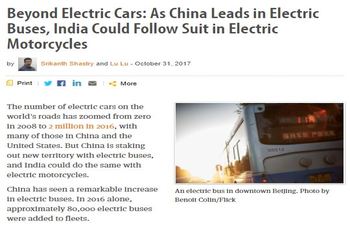Improving Bankability of E-bus Procurement in India
Publication Year: 2022
Author(s): World Bank
Abstract:
Bus transport electrification can help India achieve sustainable mobility with curtailment of fossil fuel demand, reduction of carbon emissions, improvement of air quality and public health. As of early 2021, Total Cost of Ownership (TCO) for the e-buses (both 9 and 12 meters) in intracity application was high compared to that of corresponding internal combustion engine buses due to the relatively higher upfront capital cost of e-buses, which acts as a major deterrent to wider adoption in urban public transport. Under this study, a review of various GCC tenders under FAME-II was carried out to identify issues and challenges in the approach as well as solutions to reduce the TCO gaps in intracity operation and achieve the overall goal of sustainable mobility in India. The report includes an evaluation of alternate business models on the principle of fleet aggregation and unbundling of fleet provision and e-bus operation services which can dramatically bring down the cost of e-bus services.
Source of Publication: World Bank
Vol/Issue: May 2022
Country: India
Publisher/Organisation: World Bank
Theme: Sustainable transportation | Subtheme: Public
Related Documents
Reports
How to Enable Electric Bus Adoption in Cities Worldwide
Published Year: 2019
Abstract:
Imagining the world in 2030 can be a dangerous thing. But it can also help us plot how to achi... Read More
Opinions/Videos
Safer, More Sustainable Transport in a Post-COVID-19 World
Published Year: 2020
Abstract:
The COVID-19 crisis has shown that effective public transport is vital to keeping cities runni... Read More
Opinions/Videos

Abstract:
China has seen a remarkable increase in electric buses.Transitioning to electric buses will he... Read More



